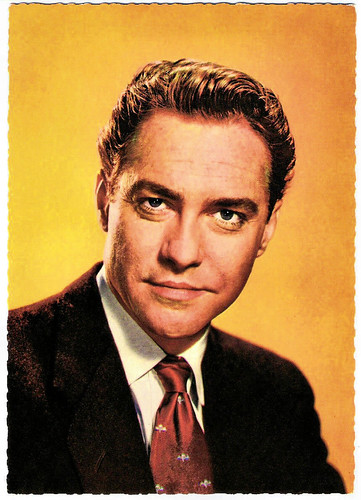
German postcard by ISV, no. A 39. Photo: 20th Century Fox.
D-Day
Richard Todd OBE was born as Richard Andrew Palethorpe-Todd in Dublin, Ireland in 1919. His father, Andrew William Palethorpe-Todd, was an Irish physician and an international Irish rugby player who gained three caps for his country.
Richard spent a few of his childhood years in India, where his father served as an army physician. Later his family moved to Devon and Todd attended Shrewsbury School. Upon leaving school, Todd trained for a potential military career at Sandhurst before inaugurating his acting training at The Italia Conti Academy of Theatre Arts.
This change in career led to estrangement from his mother. When he learned at age 19 that she had committed suicide, he did not grieve long for her, he admitted in later life. A year earlier, he had first appeared professionally as an actor at the Open Air Theatre, Regent's Park in a 1936 production of Twelfth Night.
His first film appearance was as an extra in the Will Hays comedy Good Morning, Boys (Marcel Varnel, 1937). He played in regional theatres and then co-founded the Dundee Repertory Theatre in 1939.
During the Second World War, Todd joined the British Army, receiving a commission in 1941. Initially, he served in the King's Own Yorkshire Light Infantry before joining the Parachute Regiment and being assigned to the 7th (Light Infantry) Parachute Battalion as part of the British 6th Airborne Division.
On D-Day, he participated as a captain, in the British Airborne Operation Tonga. Todd was among the first British officers to land in Normandy. His battalion were reinforcements that parachuted in after glider forces had landed and completed the main assault against Pegasus Bridge near Caen. He later met up with Major John Howard on Pegasus Bridge and helped repel several German counterattacks.
As an actor, Todd would later play Howard in the film The Longest Day (Ken Annakin a.o., 1962), while Todd himself was played by another actor.
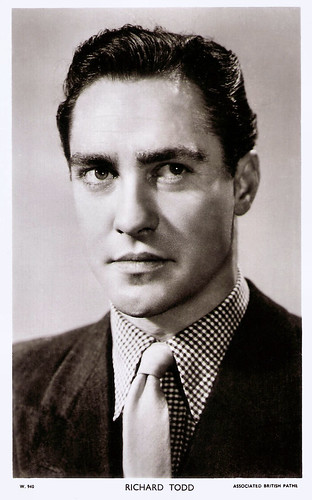
British postcard in the Picturegoer Series, no. W. 940. Photo: Associated British Pathé.
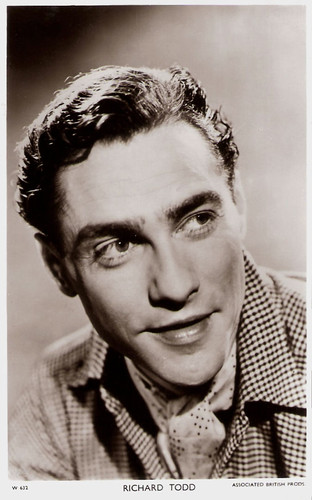
British postcard in the Picturegoer Series, London, no. W 632. Photo: Associated British Prods.
A Career Boost
After the war, Richard Todd returned to repertory theatre in the UK. He was appearing in a play when he was spotted by Robert Lennard, a casting director for Associated British Picture Corporation.
That company offered him a screen test, and subsequently signed him for a long-term contract in 1948. He was cast in the crime film For Them That Trespass (Alberto Cavalcanti, 1949).
Todd had appeared in the Dundee Repertory stage version of The Hasty Heart, playing the role of Yank and was subsequently chosen to appear in the West End version of the play, this time in the leading role of Captain Lachlan McLachlan.
He then replaced Richard Basehart in the Broadway production and was cast opposite Ronald Reagan in the Warner Bros. film adaptation, The Hasty Heart (Vincent Sherman, 1949), which was filmed in Britain. Todd was nominated for the Academy Award for Best Actor for his role as Captain MacLachlan, won a Golden Globe as Best Newcomer and was also voted favorite British male film star in Britain's National Film Awards.
Next, Alfred Hitchcock used him in Stage Fright (1950) starring Jane Wyman and Marlene Dietrich. Then he made a film in Hollywood, the drama Lightning Strikes Twice (King Vidor, 1951). Neither did particularly well at the box office.
He appeared in three historical adventure films for Disney, The Story of Robin Hood and His Merrie Men (Ken Annakin, 1952), The Sword and the Rose (Ken Annakin, 1953), and Rob Roy, the Highland Rogue (1953) with Glynis Johns.
For the BBC he appeared as Heathcliff in a very popular TV adaptation of the novel Wuthering Heights (Rudolph Cartier, 1953), with Yvonne Mitchell as Cathy. Nigel Kneale, responsible for the adaptation, said the production came about purely because Todd had turned up at the BBC and told them that he would like to play Heathcliff for them. Kneale had to write the script in only a week as the broadcast was rushed into production.
Todd's career received a boost when 20th Century-Fox signed him to a non-exclusive contract and cast him as the United States Senate Chaplain Peter Marshall in the box-office hit A Man Called Peter (1955), with Jean Peters.
This was followed by the war film, The Dam Busters (Michael Anderson, 1955) with Michael Redgrave. This was the true story of how the British attacked German dams in WW2 by using an ingenious technique to drop bombs where they would be most effective. Todd played Wing Commander Guy Gibson, which would become the defining role of his career for which he would be remembered.
Other notable films he starred in include the historical drama The Virgin Queen (Henry Koster, 1955) starring Bette Davis, Saint Joan (Otto Preminger, 1957) featuring Jean Seberg as Joan of Arc, the British war film The Yangtse Incident (Michael Anderson, 1957) and the thriller Intent to Kill (Jack Cardiff, 1958).
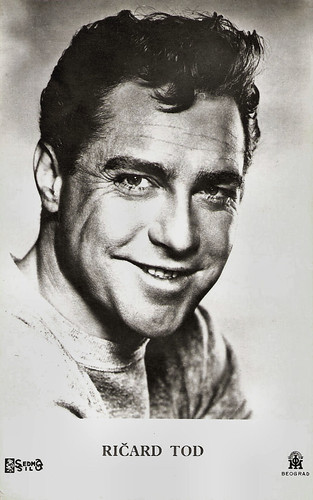
Yugoslavian postcard by IOM, Beograd. Photo: Sedmo Silo.
An Anachronism
Richard Todd was the first choice of author Ian Fleming to play James Bond in Dr. No. Todd had to turn down the role due to scheduling conflicts. And the part went to a certain Sean Connery.
Todd unsuccessfully attempted to produce a film of Ian Fleming's The Diamond Smugglers and a television series based on true accounts of the Queen's Messengers. However, he did appear in such films as the crime drama Never Let Go (John Guillermin, 1960) with Peter Sellers, the war drama The Long and the Short and the Tall (Leslie Norman, 1961), the Western The Hellions (Irwin Allen, Ken Annakin, 1961), the crime drama The Boys (Sidney J. Furie, 1962) and The Longest Day (Ken Annakin a.o., 1962).
Todd’s opportunities in the cinema substantially declined throughout the 1960s as the counter-culture movement in the Arts took hold and Todd's character-type as the heroic patriotic male lead became an anachronism to a younger audience's sentiment.
Later films included The Very Edge (Cyril Frankel, 1963) and the horror thriller Das Bildnis des Dorian Gray/Dorian Gray (Massimo Dallamano, 1970) featuring Helmut Berger.
In 1970 he founded Triumph Theatre Productions, with which he toured extensively abroad in many plays. In the 1970s, he also gained new fans when he appeared as the reader for Radio Four's Morning Story.
In the 1980s his distinctive voice was heard as narrator of the series Wings Over the World, a show about the history of aviation shown on Arts & Entertainment television. He appeared before the camera in the episode about the Lancaster bomber.
His last film appearance was in the little known action drama Olympus Force: The Key (James Fortune, Robert Garofalo, 1988) with Linda Thorson. Todd continued to act on television, including roles in Virtual Murder (1992), Silent Witness (2000), and in the Doctor Who story Kinda in 1982.
His active acting career extended into his eighties. He was appointed an Officer of the Order of the British Empire (OBE) in 1993. Todd was the subject of This Is Your Life on two occasions, in March 1960 when he was surprised by Eamonn Andrews at the BBC's Lime Grove Studios, and in November 1988, when Michael Aspel surprised him on stage at the Theatre Royal Windsor.
Both Todd's marriages ended in divorce. His first was to actress Catherine Grant-Bogle, whom he met in Dundee Repertory and was married to from 1949 until 1970; they had a son Peter (1952–2005) and a daughter Fiona. In 1960 he had a son Jeremy with model Patricia Nelson. He was married to model Virginia Mailer from 1970 until 1992; they had two sons, Andrew and Seamus (1977–1997).
Two of Todd's children committed suicide. In 1997, Seamus Palethorpe-Todd shot himself in the head in the family home in Lincolnshire. An inquest determined that the suicide might have been a depressive reaction to the drug he was taking for severe acne. In 2005, Peter killed himself with a shotgun, following marital difficulties. His sons' suicides affected Todd profoundly; he admitted to visiting their adjoining graves regularly.
Richard Todd himself suffered from cancer, and died in his sleep at his Little Humby home in 2009. He was buried between his two sons Seamus and Peter at St. Guthlacs, the church in Little Ponton, England.
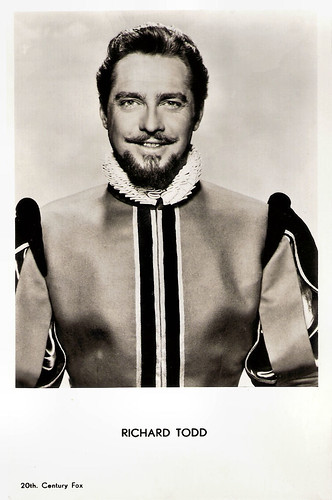
French postcard by Les Carbones Korès Carboplane. Photo: 20th Century Fox.
Sources: Jim Beaver (IMDb), Find A Grave, Wikipedia and IMDb.
2 comments:
PEGASUS BRIDGE
I--A HISTORY TO PUBLISH:
http://www.editions-pantheon.fr/francoise-h.-gondree/essais/pegasus-bridge-le-pont-de-l-espoir.html
2--A SCANDAL TO DENOUNCE :
the robbery of the private museum of aspeg “Musée de Pegasus Bridge “ by the political militaro touristique lobby called comité du débarquement………….
https://www.pegasusbridge.fr/70anniversaire-du-debarquement-le-denomme-comite-darromanches/
14 years of impunity……………complaints are still going on against him…………………..
We are at your disposal for any further information...Thanks in advance
Musée de Pegasus Bridge & Batterie de Merville
Françoise Gondrée
BP 5
14860 Ranville
www.pegasusbridge.fr
Merci pour votre information sur Musée de Pegasus Bridge.
Post a Comment